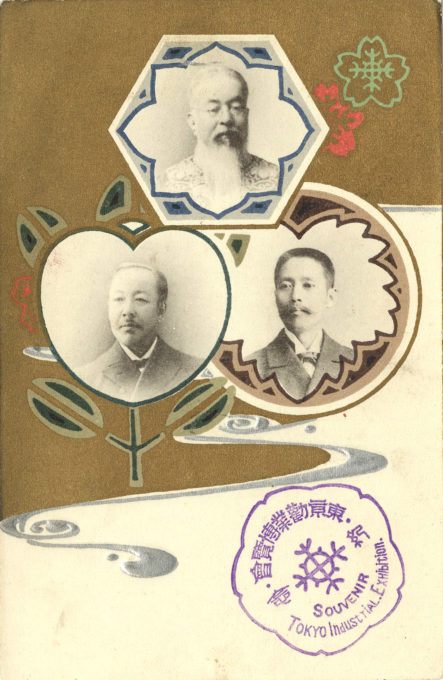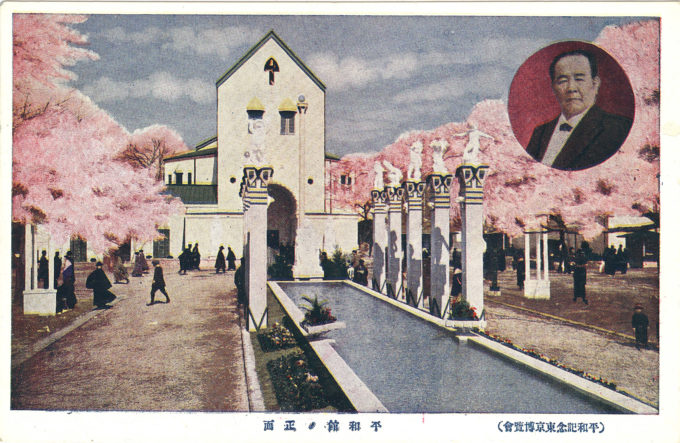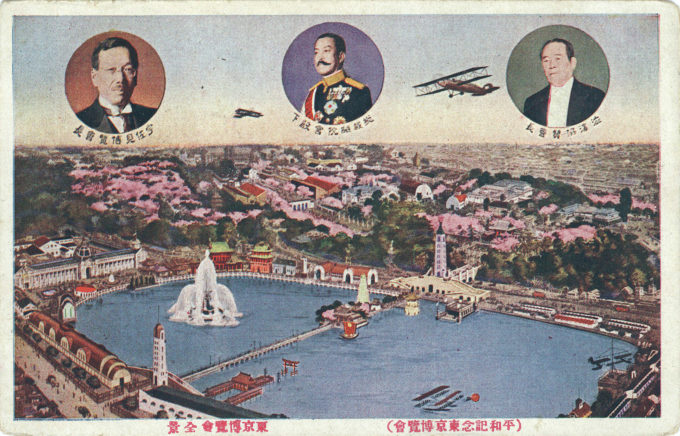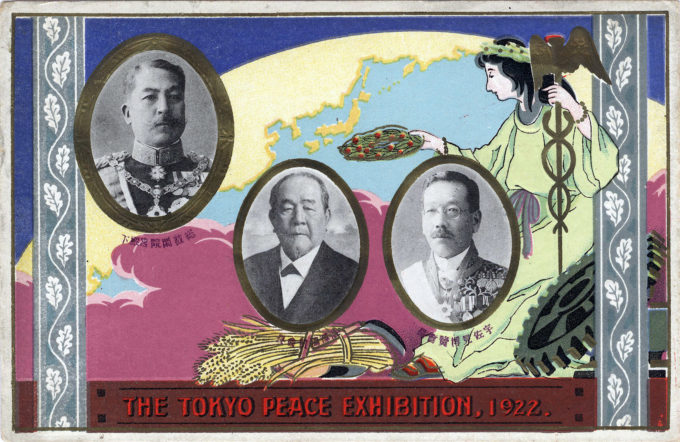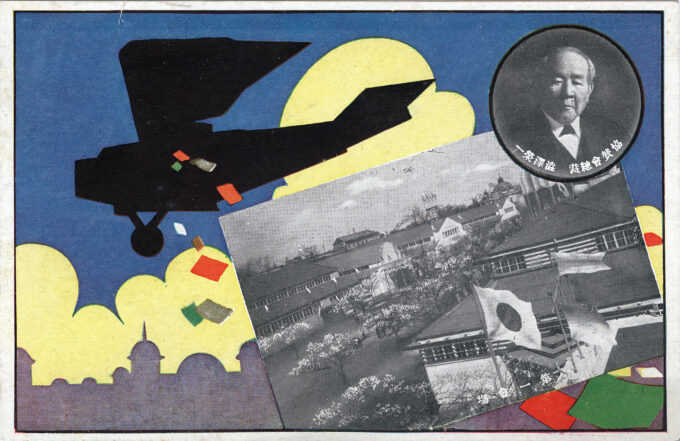
Tokyo Exposition for Domestic Industry Promotion in Commemoration of the Coronation, Ueno Park, Tokyo, 1928. Photo inset: Exposition sponsor Viscount Shibusawa Eiichi, the industrialist, banker and investor who became known as the “Father of Japanese Capitalism”. His economic philosophy was influenced by Confucianism, believing that “the path of commerce is the path of humanity” and that ethics were inseparable from business success.
See also:
Tokyo Chamber of Commerce, Marunouchi, Tokyo, c. 1910.
Peace Commemorative Exposition, Ueno Park, Tokyo, 1922.
Kobe Chamber of Commerce & Industry, Kobe, c. 1930.
“1st Viscount Shibusawa (1840–1931), born Shibusawa Eiichi, was a Japanese industrialist widely known today as the ‘father of Japanese capitalism’, having introduced Western capitalism to Japan after the Meiji Restoration. He introduced many economic reforms after the Restoration including use of double-entry accounting, joint-stock corporations and modern note-issuing banks.
Principal sponsors of the 1907 Meiji (Tokyo) Industrial Exhibition, 1907. Top: Baron Senge Takatomi, Governor of Tokyo-Fu;
lower-left: Baron Shimbusawa Eiichi, President, Tokyo Chamber of Commerce.
lower-right: Ozaki Yukio, Mayor of Tokyo City.“A banking and trading concern that Shibusawa formed in 1867 was the first Japanese company to be incorporated. He joined the Meiji government in 1869 as an official in the tax ministry and helped carry out currency and tax reforms, and revise the system of weights and measures to align with the West. In a disgreement with government policy, Shibusawa resigned from government service in 1873 and founded Japan’s first modern bank, the aptly named The First National Bank (Dai Ichi Kokuritsu Ginkō) which had the power to issue its own currency.
“Viscount Shibusawa would then involve himself as a director, shareholder, advisor, or sponsor in almost every subsequent enterprise associated with the Japan’s modernization, almost 700 in total: banking, railways, steamship companies, fisheries, printing companies, agriculture, steel plants, gas and electric industries, food manufacturing, oil and mining concerns, travel interests, and retail businesses. He retired in 1916 to devote himself to social welfare causes until his death in 1931 at ninety-one years old.
“Peace Hall’ and exposition sponsor Viscount Shibusawa Eiichi, Peace Commemorative Exposition, Ueno Park, Tokyo, 1922.
“Of the 500+ companies whose origins can be directly traced to Shibusawa’s participation as either founding investor or director, more than 150 still survive as listed companies on the Tokyo Stock Exchange, an institution which Shibusawa also founded, including Eneos (whose corporate point-of-origin dates back to the chartering of the First National Bank in 1873), Asahi Mutual Life (from the Imperial Life Insurance Co., 1888), Mitsui O.S.K. Lines, Isetan Mitsukoshi Co., Hitachi Corp., the Imperial Hotel and Sapporo Brewing Co. The Japanese Chamber of Commerce and Industry was founded by him as well.
“Viscount Shibusawa was also involved in the foundation of many hospitals, schools, universities (including the first women’s university), the Imperial Hotel in Tokyo and a host of charitable organizations including the Japan Red Cross.
Aerial view of the Peace Commemorative Exposition, Uneo Park, Tokyo, 1922. Inset photos left-right: Exhibition President K. Usami; Honorary President Prince Kan-in; Viscount Shibusawa (“father of Japanese capitalism”).
“Another notable aspect of Shibusawa’s career is that, despite being the founder of hundreds of corporations, he refused to maintain a controlling stake in any of them, effectively preventing himself from forming a zaibatsu. What is known as the ‘Shibusawa Zaibatsu’ was a holding company to look after his estate for his family. The ‘Shibusawa Zaibatsu’ did not hold controlling stakes in any companies.
“Despite his humble origin as a farmer, Shibusawa was granted the rank of Baron and later elevated to the higher-rank title of ‘Viscount’ while all other zaibatsu founders remained titled ‘Baron’. Shibusawa was also posthumously awarded Shōnii, the third-highest rank under the ritsuryō [Confucian-based civil ranking system], an honor usually reserved for imperial nobility and prime ministers.
“Shibusawa is now featured on ¥10,000 Japanese yen bank notes, one of the new designs that went into circulation in 2024, replacing 19th century educator Fukuzawa Yukichi.”
– Wikipedia


